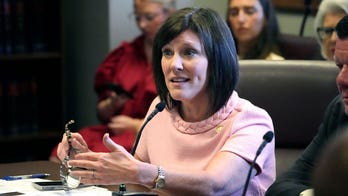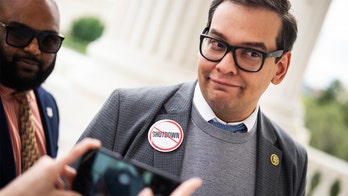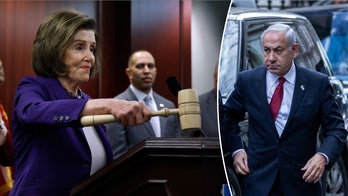Sens. John Kerry, D-Mass., and John McCain, R-Ariz, have been working for some time on a nonbinding resolution to express support for the U.S. involvement in the NATO mission in Libya (also involved: Sens. Levin, Feinstein, Graham, Chambliss, Lieberman).
The resolution "supports the limited use of military forces by the United States." It also calls on President Obama to "consult regularly with Congress" and to provide a description of the U.S. policy objectives in the mission.
It is not, however, an outgrowth of the War Powers Resolution with which the White House says it is in compliance. The WPR says the President must, within 60 days of U.S. armed forces involvement in a conflict, come to Congress to seek authorization or cease military operations within 30 days.
The McCain-Kerry resolution has less to do with that and more to do with an effort to support the troops and the effort. Both senators have said repeatedly that it is important that the U.S. be outspoken in its support for the Arab Spring. Their resolution would be part and parcel of that, but a senior Senate GOP leadership aide tells Fox that it is wholly separate from the WPR.
The Senate duo has gone back and forth for weeks on whether or not a resolution is needed, but McCain told Fox News on Tuesday that the White House is now on board with a vote. "We've been working with the White House on it. They were a bit conflicted, as well. Now, I think they want to get the resolution done, if the leadership wants it."
Senate Majority Leader Harry Reid, D-Nev., told reporters Tuesday that a vote would have to wait until after the Memorial Day recess, which begins Friday.
It won't all be smooth sailing, however, once the leadership sets a vote for the measure. Key members like Richard Lugar of Indiana, top Republican on the Foreign Relations Committee and respected diplomat, as well as, Susan Collins of Maine, top Republican on the Homeland Security and Governmental Affairs Committee.
"In the period following the commencement of our military intervention in Libya, your Administration committed to consult closely with Congress on our policy in Libya and to conduct military operations there in a manner consistent with the War Powers Resolution," Lugar wrote in a letter to Obama. "These commitments have... gone unfulfilled."
A Lugar aide tells Fox that the senator feels, instead, that the Obama Administration is seeking "carte blanche" with regard to Libya. Collins said she shares Lugar's concerns.
Freshman Sen. Rand Paul, R-Ky., and some other fiscal conservatives have also taken issue with the mission in Libya. Both cost, the operation's price tag is now at more than $750 million, and compliance with the WPR are at issue for this group.
The U.S. has now taken a back seat in the NATO-led operation, though some lawmakers have said that is not really accurate given that a U.S. admiral sits atop the NATO military structure.
Here's the text of the resolution:
Expressing the sense of the Senate on United States military operations in Libya.
Whereas peaceful demonstrations that began in Libya, inspired by similar movements in Tunisia, Egypt, and elsewhere in the Middle East, quickly spread to cities around the country, calling for greater political reform, opportunity, justice, and the rule of law;
Whereas, Muammar Qaddafi, his sons, and forces loyal to them responded to the peaceful demonstrations by authorizing and initiating violence against civilian non-combatants in Libya, including the use of airpower and foreign mercenaries;
Whereas, on February 25, 2011, President Barack Obama imposed unilateral economic sanctions on and froze the assets of Muammar Qaddafi and his family, as well as the Government of Libya and its agencies, to hold the Qaddafi regime accountable for its continued use of violence against unarmed civilians and its human rights abuses and to safeguard the assets of the people of Libya;
Whereas, on February 26, 2011, the United Nations Security Council passed Resolution 1970, which mandates international economic sanctions and an arms embargo;
Whereas, in response to Qaddafi's assault on Libyan civilians, a ‘‘no-fly zone'' in Libya was called for by the Gulf Cooperation Council on March 7, 2011, by the head of the Organization of the Islamic Conference on March 8, 2011, and by the Arab League on March 12, 2011;
Whereas Qaddafi's advancing forces, after recapturing cities in eastern Libya that had been liberated by the Libyan opposition, were preparing to attack Benghazi, a city of700,000 people and the seat of the opposition Government in Libya, the Interim Transitional National Council;
Whereas Qaddafi stated that he would show ‘‘no mercy'' to his opponents in Benghazi, and that his forces would go ‘‘door to door'' to find and kill dissidents;
Whereas, on March 17, 2011, the United Nations Security Council passed Resolution 1973, which mandates ‘‘all necessary measures'' to protect civilians in Libya, implement a ‘‘no-fly zone'', and enforce an arms embargo against the Qaddafi regime;
Whereas President Obama notified key congressional leaders in a meeting at the White House on March 18, 2011, of his intent to begin targeted military operations in Libya;
Whereas the United States Armed Forces, together with coalition partners, launched Operation Odyssey Dawn in Libya on March 19, 2011, to protect civilians in Libya from immediate danger and to enforce an arms embargo and a ‘‘no-fly zone''; and
Whereas, on March 31, 2011, the United States transferred authority for Operation Odyssey Dawn in Libya to NATO command, with the mission continuing as Operation Unified Protector: Now, therefore, be it
Resolved, That the Senate-
(1) supports the aspirations of the Libyan people for political reform and self-government based on democratic and human rights;
(2) commends the service of the men and women of the United States Armed Forces and our coalition partners who are engaged in military operations to protect the people of Libya;
(3) supports the limited use of military force by the United States in Libya as part of the NATO mission to enforce United Nations Security Council Resolution 1973 (2011), as requested by the Transitional National Council, the Arab League, and the Gulf Cooperation Council;
(4) agrees that the goal of United States policy in Libya, as stated by the President, is to achieve the departure from power of Muammar Qaddafi and his family, including through the use of non-military means, so that a peaceful transition can begin to an inclusive government that ensures freedom, opportunity, and justice for the people of Libya;
(5) affirms that the funds of the Qaddafi regime that have been frozen by the United States should be returned to the Libyan people for their benefit, including humanitarian and reconstruction assistance, and calls for exploring with the Transitional National Council the possibility of using some of such funds to reimburse NATO member countries for expenses incurred in Operation Odyssey Dawn and Operation Unified Protector; and
(6) calls on the President-
(A) to submit to Congress a description of United States policy objectives in Libya, bothduring and after Qaddafi's rule, and a detailed plan to achieve them; and
(B) to consult regularly with Congress regarding United States efforts in Libya.




